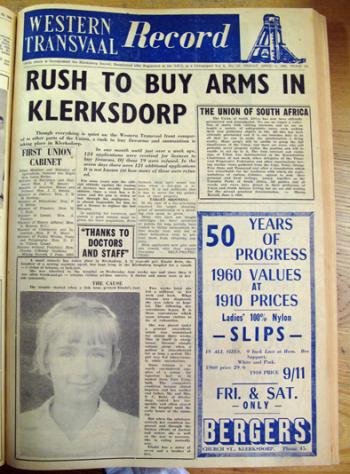Posted on December 12, 2010

In the hullabaloo around the Protection of Information Bill and the proposed media tribunal anyone has considered what implications the restriction of the free flow of information is likely to have on the construction of history? If information is withheld from public circulation, either because the 'authorities' deem it to be a threat to national security, or because journalists censor their own stories for fear of prosecution, over time, it will be rendered invisible to all but the most dedicated researchers.
I have been fascinated by the furore surrounding the WikiLeaks disclosures, not because of the content of the diplomatic cables which have embarrassed so many governments, but because of the cult status it has given to Julian Assange. The WikiLeaks founder has been drawn reluctantly into spotlight; demonised as a traitor by some and passionately lauded as a hero by others, who have sprung to his defence, supporting his insistence on lifting the veil of secrecy imposed by governments on their actions. I am certain that the recent disclosures will provide much food for thought for those studying the subtle nuances of international relations, contrasting official statements and publicly held positions with private perceptions.
But what of those whose lives are not played out in the news headlines? Where is the record of their lives? I think of 'Edge of the Table'Â, the Human Rights Media Centre's new publication in which fourteen young people speak of their experiences of growing up on the Cape Flats. This publication provides a fascinating counterpoint to the headlines generally associated with this area, challenging perceptions of the Cape Flats, putting a human face to the crime statistics. I think too of the members of the Khulumani Support Group, who share their memories in the process of healing the harm done by apartheid. The 'big' narrative is familiar to most of us, but it's the poignant detail of daily life that brings home the reality of an unjust system and the courage and fortitude of the people who fought against it, while at the same time trying to eke out a living and meet the basic needs for shelter and sustenance. These stories are as much a part of our history as the ones headlined in the media.
If the statement, 'today's news is tomorrow's history'Â holds true, it imposes three particular responsibilities on those of us involved in the broader archival sector: we need to resist all efforts to control the free flow of information; we need to play a role in documenting the 'small stories'Â, to ensure that these are not lost to history and; we need to keep the records safe so that they are available to future generations.
Jo-Anne Duggan is the Director of the Archival Platform